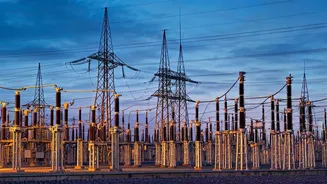Initial Market Reaction
The stock market's reaction to GE Vernova has been rather significant, with a notable drop in the company's stock value. This decline immediately triggered
discussions among investors and analysts, prompting a closer examination of the underlying factors. The primary concern revolves around the power-demand forecasts and the potential for a softening in the growth trajectory of the energy sector. This initial market response underscored the sensitivity of the stock to evolving perceptions of future energy consumption, especially in light of the transition to cleaner energy solutions. The rapid shift in investor sentiment highlights the intricate interplay of economic projections, technological advancements, and geopolitical influences that shape market dynamics.
Power Demand Concerns
A core driver behind the investor unease is the apprehension about the sustainability of the power-demand boom. The impressive growth in energy needs witnessed over recent years has led to the expectation of robust demand. However, there are growing concerns that this rate may not be sustainable, particularly in light of economic uncertainties and potential shifts in energy policies. The market has begun to question whether the projections for expanding energy requirements are realistic. The pace of investment in renewable energy and the efficiency of energy usage are becoming crucial factors influencing the outlook for traditional power solutions. Analysts are now closely monitoring indicators such as industrial output, consumer behavior, and government regulations to assess the overall health of the energy sector, which will in turn influence the trajectory of GE Vernova.
Investor Sentiment Shift
Another key facet of the market's behavior is the shift in investor sentiment. The initial optimism surrounding the power-demand surge might be slowly giving way to a more cautious approach. This change can be attributed to several factors, including the evolving macroeconomic conditions, uncertainty around interest rates, and the complex geopolitical landscape. Investor confidence plays a crucial role in stock performance. As perceptions change, it can amplify the impact of any news or data, creating a feedback loop of buying and selling. The shift underscores the importance of transparent communication and consistent performance for companies like GE Vernova. Any signs of potential headwinds in demand can quickly turn into a source of worry, leading to a downward revision of stock valuations. Therefore, the ability to adapt and navigate uncertainty is a critical factor.
Broader Industry Implications
The impact of any downturn experienced by GE Vernova is not restricted to the company alone; it is likely to have repercussions across the entire industry. As a key player in the power sector, any significant fluctuation in GE Vernova's performance has the potential to influence the strategies of competitors, suppliers, and other related entities. This will influence market dynamics in the renewable energy sector, as well. For example, if the demand for traditional power solutions weakens, there might be a greater focus on investments in renewable energy. Moreover, regulatory actions and governmental policies designed to stimulate or curb energy consumption have the potential to further shape the competitive environment. The interplay of all these factors would determine the rate of technological adoption, the growth of new markets, and the survival of older technologies.
Future Outlook for GE
Despite the current market uncertainties, GE Vernova is well positioned to navigate the challenges. The company's diverse portfolio of products and services, combined with its experience and technological capabilities, places it in a strong position for the future. The company's resilience relies on its capacity to adapt to changing market conditions. The focus will need to shift to maximizing efficiency, optimizing operations, and seeking new growth areas within the renewable energy domain. The extent to which GE Vernova can effectively adapt to emerging trends, manage its financial health, and preserve investor confidence will determine its long-term success. The management's ability to communicate a clear vision for the future, highlighting the company's commitment to innovation and sustainability, will play a crucial role.




















